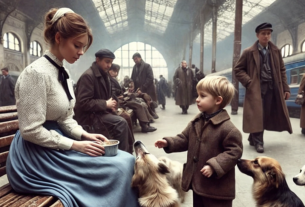Valery made one last walk around the empty hall of his restaurant. Today, he had sent all the staff home, and now only a small amount of food remained in the establishment. He decided that in a couple of days he would come back, gather everything necessary, and donate it to a charitable shelter.
His restaurant had existed for only five years. At the very beginning, things went well — people came, the place was popular. But a year ago, a fast-food café opened nearby, and customers started drifting there. Fast and inexpensive food became preferable to the refined dishes his restaurant served. Valery thought the fast-food craze would soon pass — after all, no one could eat just that all the time. However, it turned out the main problem was not that: guests started coming less often because the head chef planned to move to another place and stopped monitoring the quality of the dishes.
Valery regretted that he had long stopped tasting every new dish before adding it to the menu. When he finally realized the food was no longer the same, the place was almost empty. He fired the cooks immediately, but it didn’t help — the reputation was already tarnished. Valery tried to take over the kitchen himself; he cooked well, but never reached the previous level.
In the end, he had to decide what to do next — close or sell the business. He chose to sell because at the start he had taken a loan, and without the restaurant’s income, he couldn’t repay it. The premises were filled with a dreary atmosphere of neglect. To find a buyer, everything had to be put in order.
In the courtyard, he recalled how not long ago the waitresses would gather there for smoke breaks, chatting and laughing, and he could hear their laughter from his office, whose windows faced the yard.
Suddenly, he noticed movement behind a bush and headed that way.
“Hello, sorry…” came a voice from the bushes.
Before him stood a woman with a worried look, next to her a little girl about five years old.
“Why are you hiding here?”
The woman sighed:
“We didn’t know the restaurant was closed. The girls used to sometimes bring us something to eat… We will leave.”
She had already taken a step away, but Valery stopped her:
“Wait. Don’t you have a permanent place to live?”
She smiled slightly and replied:
“Not right now, but it’s temporary. I will definitely find a way.”
He wanted to ask for details, but from her eyes, he understood it was better not to pry.
“Which girls helped you?” he asked.
“Do you want to punish them?”
“No, just curious. Was it Tamara, Olya, and Sveta?”
The woman nodded.
“Do you know how to clean and tidy up a place?”
She was surprised but answered:
“I think every person is capable of that.”
“Then come with me,” Valery said, pointing to the restaurant. “See for yourself — everything here has become dilapidated. If you want, you can live here for some time and help me get everything in order. There’s enough food to last a while.”
“Can we cook?”
“Yes, as much as needed. I’ll leave you the key to the back door so you can come and go freely. There’s a couch, pillow, and blanket in the office.”
The woman smiled:
“I promise everything will shine here.”
Valery showed her the kitchen, the food supplies, and cleaning equipment. Before leaving, he asked one more question:
“Sorry if this sounds too personal… You don’t look like a homeless person.”
The woman, whose name was Lera, lowered her gaze:
“My husband started seeing another woman, and for complete family happiness, he only lacked our daughter. He never cared about Rita; he only cared about his image. Now I can’t fight for the child, so I left and wander.”
Valery shook his head — he had heard such stories before. In his thoughts, he asked himself: “Why do you all put up with such men?”
Lera seemed to hear his inner question:
“I know what you’re thinking, but he wasn’t always like that. Or maybe I just didn’t notice before. We met when I was twenty. I had housing that the state gave me as an orphan; we sold it to buy a house. Of course, he also invested money, but now he has a roof over his head, and I have nothing.”
Valery grabbed the door handle:
“All right, I won’t keep you longer. In the desk drawer in my office are business cards with a number. Call if you need anything.”
Lera gently touched his hand:
“Tell me, why did you decide to close the restaurant? It was a good place, popular.”
Valery smiled sadly:
“That’s how it happened. Do you think only women get betrayed? Friends and partners betray too. I need a couple more weeks to find a buyer.”
As he left, he felt they were no longer strangers to him. Now he cared about what would happen to them.
Three days later, he stopped by again. Inside, there was a businesslike bustle — tables were neatly pushed to the walls, curtains taken down for washing.
“Looks like they’re not relaxing here but working seriously,” he noted.
Lera looked fresher, energy shining in her eyes.
“And even lunch is set?” Valery was surprised to see a laid table.
“There’s so much delicious food here,” Lera replied shyly.
Little Rita helped her mother set the plates, sticking out her tongue in concentration. Watching them, Valery smiled — he hadn’t eaten anything tastier in recent days.
“Did you study cooking professionally?” he asked.
Lera laughed:
“Of course I studied. And honestly, if I could, I would spend all day just cooking. I love turning ordinary products into real works of art.”
Valery sighed:
“It’s a pity we didn’t meet earlier. Together, we could have made this restaurant truly successful.”
Lera looked at Valery carefully, in her eyes was not only worry but also hope — the kind that doesn’t fade even in the darkest times. She sat at an old wooden table where once glasses of wine stood, and now documents about the restaurant’s closing lay.
“Why not try again?” she asked quietly but with such confidence in her voice that Valery involuntarily shuddered.
He thought. His gaze fell on the empty hall where music, guests’ laughter, rustling tablecloths, and muted conversations of waitresses had recently sounded. But now it was quiet. Too quiet.
“That’s too risky,” he finally answered, trying to find the right words. “If I make a mistake, I’ll be in debts I can’t get out of. I just don’t have the right to fail.”
Lera took a deep breath, as if gathering strength. Her voice trembled:
“It’s a pity… I always liked this place. My husband and I used to come here in the first years after our wedding…” She paused, recalling the days when everything was different — when love was real and promises strong. “Don’t worry, I’ll manage to get everything in order. Just give me a heads-up.”
Valery visited several more times but never dared to go inside. Every time the thought of selling the restaurant surfaced, his heart ached. He felt as if he was losing a part of himself, the part that held memories, warmth, and meaning.
The day of the deal came. Valery, gathering courage, went to the restaurant with the buyer and several assistants. The bank owner, who was providing a substantial loan for the purchase, also came. Everyone was serious, businesslike, ready to negotiate.
First, they agreed to inspect the restaurant inside, then discuss the price. Valery understood: he wanted to sell for a decent amount, but the buyer hadn’t agreed to his terms yet. However, opening the door, everyone was stunned. Inside was perfect cleanliness; fresh flowers stood on small side tables; the air was filled with a faint scent of lemon and mint. The bank owner looked at Valery puzzled:
“Is your restaurant really closed? This looks like the best working establishments!”
“Today we made an exception, especially for you,” Valery replied with a slight smile, inviting the guests to sit.
Then he headed to the kitchen. Little Rita, sitting in his office, was drawing on her lap while a cartoon played nearby. He found Lera in the kitchen — she was standing by the stove, carefully stirring sauce. Her face was pale, her gaze anxious.
“Did something happen?” he asked with concern.
“Yes… among your guests is my ex-husband. The one who tried to take my daughter away and left us homeless.”
“Really? Which one?”
“The one in the blue suit.”
“Interesting,” Valery said thoughtfully, “because he’s the buyer.”
“How did he manage to get the money to buy the restaurant?”
“He’s taking a loan. Leave it, I’ll carry everything out myself so he won’t see you.”
Fifteen minutes later, the hall was silent — everyone was focused on eating. The dishes were amazing, each one seeming a masterpiece. Finally, one of the guests exclaimed:
“Oh my God, it’s so delicious I didn’t even notice I ate everything!”
The bank owner nodded and added:
“If you decide to buy this restaurant, be sure to persuade whoever cooked this to stay with you. Otherwise, it will be extremely difficult to find someone of that level.”
All eyes turned to Valery, who hesitated slightly, as if not knowing what to say. But at that moment Lera entered the hall. Her appearance was unexpected and almost theatrical.
“Hello,” she said softly, carrying herself with surprising confidence.
The buyer jumped up, his face twisted with shock:
“Lera! What are you doing here?”
“I’m cooking here,” she replied calmly. “And please, don’t shout.”
“How?! Since when did you dare to do this?”
Lera shrugged:
“Maybe since you brought another woman into our home? Or when you left me and our daughter out on the street?”
“How dare you!” exploded the ex-husband. “You kidnapped my daughter!”
The bank owner, watching the scene, looked at Valery, who just nodded:
“I know. If you want, I can tell you more.”
The banker stood up and calmly stated:
“Sorry, but I don’t want to deal with such people. The loan is denied.”
Valery, smiling, turned to the buyer:
“You know, I’ve changed my mind about selling the restaurant. With such a head chef, we will restore its former glory.”
The buyer turned red:
“You’ll regret this. And you, Lera, too. I’ll take your daughter away from you. You have neither money nor a home.”
“You’re wrong there,” Valery said firmly. “Lera is now my fiancée, and Rita will be under my protection.”
The ex-husband left, casting a last spiteful glance, and Lera quietly cried from relief. The bank owner, smiling at Valery, said:
“I’m ready to provide you a loan on the best terms. Just make sure there’s always a spot for me in this place.”
Three months passed. Changes in the restaurant hall were minimal — everything kept its former cozy look. But in the kitchen, a real revolution took place: new equipment, modern technology, new recipes and ideas. Valery called his former waitresses, and those who could, returned to work. The restaurant was expecting guests again.
The day before reopening, the kitchen was bustling with work. Valery peeked in a couple of times but was immediately sent away because “it’s important not to interfere.” He sat in the hall, looking around — everything looked perfect. He knew it was thanks to Lera. She felt every detail, every little thing, every nuance.
Rita came over and, keeping the conversation, said:
“They don’t let you in there?”
“They don’t,” Valery sighed.
“Don’t be sad, they don’t let me either,” the girl smiled, imitating adult seriousness. “When mom cooks, she doesn’t notice anyone around.”
Valery smiled:
“Even you?”
“Even me,” Rita answered seriously. “But I don’t mind. Mom is passionate.”
He understood that Rita might not fully understand all the expressions, but her sincerity and purity were worth more than any knowledge.
Lera and Rita now lived with Valery. He took them in right after Rita had an accidental encounter with Lera’s ex-husband. Valery hired an experienced lawyer and handled Lera’s property division, though her ex-husband interfered with the process. Lera didn’t yet know it, but today she officially became a free woman, and the ex transferred compensation for her share in the apartment to her card.
“Rita, how about some ice cream?” Valery suggested.
“Let’s! Just don’t let mom see! She always says sweets are bad in the evening,” the girl answered.
An hour later, Lera came into the room and, smiling while watching Valery and Rita happily eating ice cream, noticed the empty box and nearly lost her speech:
“Are you crazy? You ate it all!”
Rita quickly glanced at Valery and giggled, then ran after him as he cheerfully headed for the exit. They walked together to the embankment, where Lera, having caught up and caught her breath, walked alongside Valery. Suddenly he stopped unexpectedly and, smiling at her, said:
“You know, today you’re officially free. It’s all over. Maybe now you’ll be skeptical about marriage?” he teased.
“I don’t know, I haven’t even thought about that,” Lera replied.
“Then think about it,” Valery turned her to himself and kissed her gently. “But not for too long. I already bought a ring.”



